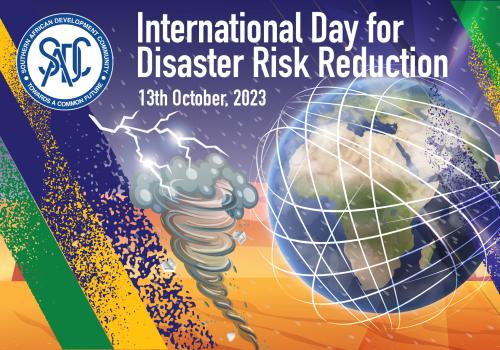The Southern African Development Community (SADC) joins the global community in commemorating this year’s International Day for Disaster Risk Reduction, a day which falls on the 13th October 2023, calling for the global community to step up efforts to mitigate the impacts of disasters.
This year, the International Day for Disaster Risk Reduction is celebrated under the theme “Fighting Inequality For A Resilient Future.” Unequal access to basic social services, such as finance and insurance, leaves most people at risk, exposing them to the danger of disasters, while disaster impacts not only exacerbate inequalities but also push most people further into poverty.
SADC notes with concern these inequalities and inconsistencies, and is therefore committed, through its Regional Indicative Strategic Development Plan 2020-2030, to improve disaster risk management in support of regional resilience and integration. At national levels, SADC Member States have demonstrated this commitment through the integration and implementation of the Sendai Framework on Disaster Risk Reduction (DRR) and the African Union Programme of Action for the implementation of the Sendai Framework on Disaster Risk Reduction.
To date, all SADC Member States are implementing National DRR Strategies aligned to the Sendai Framework, while others are in the process of aligning their Strategies to the global Framework. This commitment has also been demonstrated through the operationalization of the SADC Humanitarian and Emergency Operations Centre (SHOC) that is based in Nacala, Mozambique. The Centre will ensure that there is a coordinated disaster risk management in the region.
As we commemorate this day, I call upon SADC Member States and the global community to step up efforts to mitigate the impacts of disasters through, among others, sustained mitigation of global warming and the impacts of climate change, accelerated effort and investment in disaster risk reduction, enhance resilience, and develop measures to ensure equal access to basic social services. All these are to ensure that disaster risk management efforts, including early warning systems, protect everyone on earth by 2027. It is only through such coordinated and deliberate actions that we can realize a meaningful disaster risk reduction for all.
The SADC region continues to grapple with the devastation from disasters, more often resulting in the loss of lives and extensive destruction of property and infrastructure. It is projected that disasters will continue with increased intensity and frequency in the foreseeable future, resulting in heightened negative social and economic impacts. Between February and March 2023, the catastrophic Tropical Cyclone Freddy ravaged the region and affected over two (2) million people with a cumulatively 1,400 deaths in Madagascar, Malawi, and Mozambique. Post disaster reconstruction and recovery needs resulting from the destruction of property, infrastructure and environmental assets caused by the cyclone are substantial. The 2023 SADC Regional Vulnerability Assessment and Analysis Synthesis Report highlights that because of the complex interaction between persistent structural issues and recent shocks experienced in the region, 37.5 million people are estimated to be food insecure during the period from 1 April 2023 to 31 March 2024 in eight SADC Member States that submitted data. This situation calls for enhanced and well-coordinated regional efforts for Disaster Risk Reduction in the region, to ensure that everyone has access to disaster risk management services.

